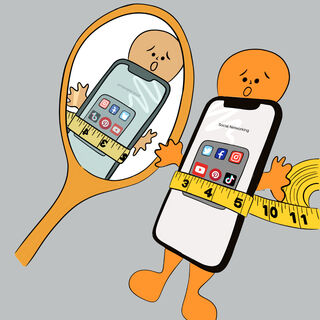Social Media’s Unhealthy Connection to Body Image and Beauty Standards

October 11, 2022
Beauty standards in America have changed over time. Yet now, with our easily accessible and new technology, beauty standards can be ingrained into anyone’s mind – including impressionable, young girls.
A youthful glow accompanied by flawless skin. A dainty, small waist with curves in only the specific “right” places. Almond eyes with plump lips and a button nose, makeup that isn’t “too much” but not none at all. Symmetrical features and long, shiny hair with straight white teeth, and a soft, feminine voice that wouldn’t dare to interject or argue. An unobtainable, cookie-cut mold that present-day American beauty standards say women should fit.
With advanced editing software available to anyone who wishes, social media has become a place of make-believe and harassment. Celebrities are put on a pedestal with countless eyes awaiting their fall. The words they speak are heard by millions; an audience in which the majority are young girls. Marketing now is fueled by the insecurities of our youth. From placebo pills to makeup that “will alter physical appearance”, the cut-throat competition to be the definition of perfection is everywhere.
Mindlessly scrolling through social media and being glued to your phone aren’t uncommon phenomena in today’s society. The comparison to real humans to what’s seen on our screens is damaging to one’s self identity. They contribute to the increasing low self esteem and body dysmorphia found in our generation.
Madeline Kick and Pamela Keel conducted a study in 2020 on the connection between posting edited photos online and mental health issues centered around anxiety with eating. In their study, the researchers found that sharing edited photos on social media did contribute to shape/weight concerns and thus unhealthy urges to exercise and restrict food activity and intake.
The New York Times asked teenagers on their Student Opinion forum on the topic of social media and body image as they view it.
Social media is one of the most harmful places a young lady can find herself trapped in. The body shaming and normalization of mental abuse are all regular things pointed at her. She’s a target for public humiliation, with any aspect of herself being “bullseye.” It’s not even the social media platforms, it’s the people behind the screens who taunt and belittle. People who affect others in such a negative way shouldn’t be allowed to freely degrade others; rather should be held accountable and banned on the social media platforms they are on. Research done suggests that most teens who use social media are more likely to suffer from depression. Studies done even say that young girls who are on social media are more chanced upon having a low self esteem, poor body image and more probable than most to participate in drinking, smoking, and early sexual activity. When these adolescents go through such things, they avoid making contact with their parents or any adult figure present in their life. They avoid the help they truly need and ways to get it.
It’s always important to be consistent in reminding yourself of the “truth” behind the pictures you see on social media and unfollowing accounts that are hurtful towards your mental health and give you emotional/mental distress, along with limiting the time you spend on your phone as well. Beauty is in the eye of the beholder; when it comes to physical attractiveness, imperfections are more or less a made up construct and very subjective. The important thing to note is that the media you consume is full of false narratives and information. The only priority when it comes to beauty standards and social media should be your own well-being.

